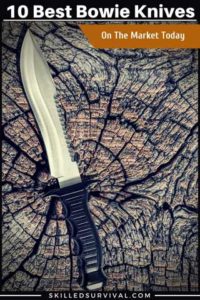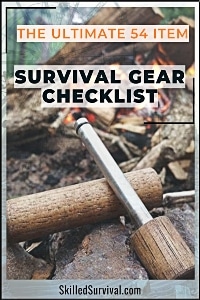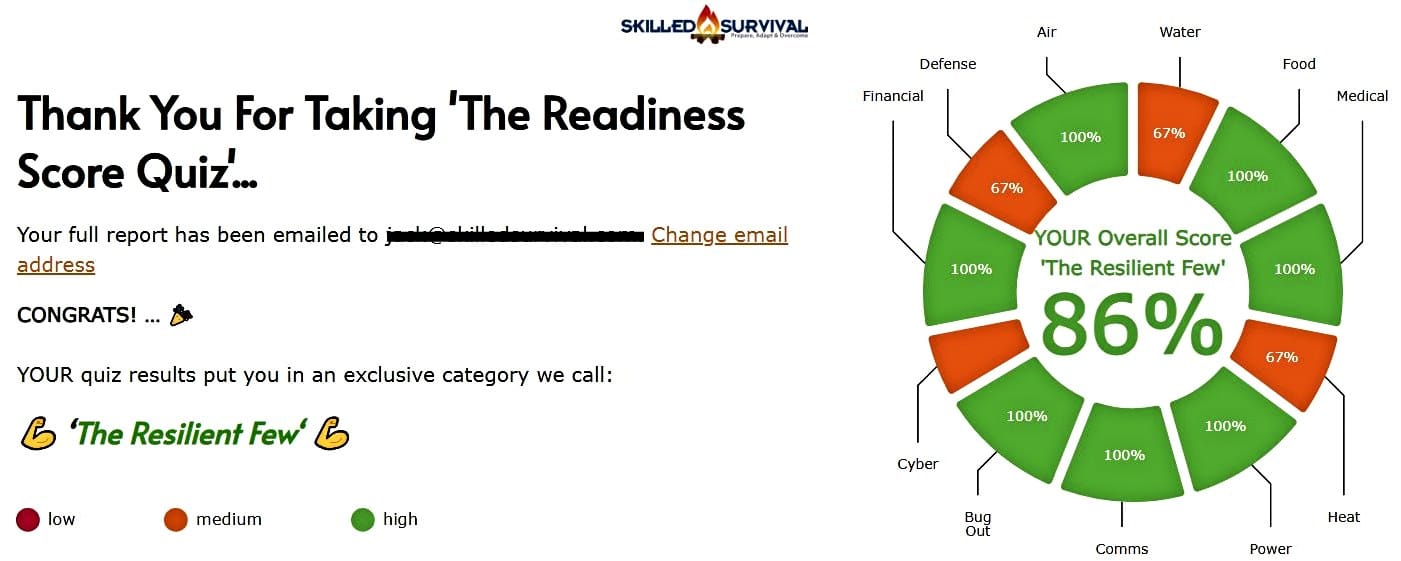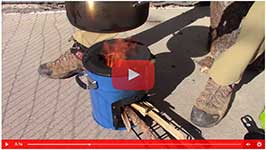
The Bowie Knife—often considered the ultimate survival tool.
But here’s the problem: with so many makes and models on the market, it’s like being a kid in a candy store… too many choices!
So, how do you pick the right one? Which should you avoid like the plague? And, perhaps most importantly, how do you actually use this iconic blade?
Don’t worry, today we’re going to slice through the confusion and help you find your perfect Bowie!
Best Bowie Knives For Sale Today
↓ KA-BAR Fighting Review
With a sturdy 10-3/4" long blade, the Cold Steel Wild West Bowie is a classic big tactical Bowie knife.
The overall length of 16" makes this a hefty knife, with a 1090 carbon steel blade.
Several reviews note that it comes with a very dull edge from the factory. So plan to take some time to get a good sharp edge before use.
The leather sheath and rosewood scales make it an attractive option as well.
PROS
- Big, heavy blade design
- Well-constructed
CONS
- Factory edge grind may be uneven and dull
- High Price
- Heavy to carry
↓ Cold Steel Wild West Bowie Review
Lots of us started with a smaller Buck Knife when we were kids. I know the one I got in Boy Scouts was the first knife I learned how to sharpen and take care of myself.
This full tang Bowie Knife has some of the best construction and cleanest lines I've ever seen in a Buck knife.
It's well balanced, and the Micarta scales on the handle provide a smart shape for a solid grip.
These features make it an especially good Bowie hunting knife.
PROS
- Lifetime warranty
- Great construction
CONS
- Very expensive
- Small for any chopping tasks
↓ Buck 124 Knife – Hard Use
There is no doubt that SOG makes some of the best tactical knives on the market. But that comes at a bit of a price premium.
Their construction and material selection is second to none. And it's backed by a lifetime warranty.
This knife design has been part of the company catalog for over 20 years and remains a best seller.
PROS
- Durable titanium nitride coating prevents corrosion
- Comfortable leather disc handle
CONS
- Very expensive
- The sheath isn't as good as you'd expect at this price point
↓ SOG Bowie Survival Knife
This Ka-Bar can handle extreme abuse under a variety of combat and survival chores.
The 1095 carbon steel is durable yet easy to sharpen. The handle uses a Grivory, a fiberglass/nylon composite material.
PROS
- Synthetic construction is resistant to corrosion
- A large 9" blade is good for chopping tasks
CONS
- There are knockoff copies on the market with poor quality construction and materials. So buyer beware.
- Some have noted that the handle is not well-textured, making it somewhat harder to grip.
↓ Ka-Bar Beck Combat Bowie Crewman Review
When it comes to knives, not all have to be collector's items. Sometimes, an inexpensive utility tool is the best for the job.
This big Bowie knife from Mossy Oak features a blade with a nearly 10" cutting edge. Plus, this survival Bowie Knife comes with a sawtooth back for camp chores.
The rubberized handle is excellent for grip in slippery, wet conditions. And the black anodized surface prevents corrosion.
PROS
- The stainless steel blade is corrosion-resistant and holds an edge well
CONS
- A stainless steel blade is hard to sharpen if you ding it.
- Though it claims a full tang, users noted a partial tang ("rat-tail tang") and a weak point in the design. This "tang confusion issue" may no longer be a problem in later versions - as these reports are all older.
Schrade is another affordable survival Bowie Knife option. The Shrade Leroy Bowie is a solid choice for anyone looking for a well-balanced, large blade.
The stainless steel alloy, while made in China, is of good quality and holds an edge well. But many have noted the factory grind is uneven. So buyers may want to re-establish a primary bevel before fine-tuning the sharpening.
But re-beveling is not a trivial task with stainless steel. So those who persevere can reward themselves with a quality blade at a fair price.
PROS
- Good quality steel
- Textured rubberized grip
CONS
- Stainless steel is hard to sharpen
- Uneven factory grind
↓ Schrade Bowie Style Chopper Review
At over 15" overall and sporting a 9.75" blade, the Ontario Knife Company's Spec Plus Marine Raider is another BIG Tactical Bowie knife.
This version features a powder-coated 1095 carbon steel blade with full tang construction.
The use of carbon steel and full tang creates a great durable blade for both combat and survival. The Kraton handle, and leather sheath makes sure it's always ready for you.
PROS
- Great knife at this price point
- 1095 carbon steel is easy to maintain
CONS
- Some uneven factory grinds
- Occasional quality control issues
↓ It’s Really Good! Ontario Marine Raider Bowie
ere's another fantastic knife from Cold Steel.
The 1917 Frontier Bowie has a 1055 carbon steel blade that measures 1/4" thick!
At 12" long, this is a massive chunk of metal with a solid hardwood handle, which makes it incredibly stable.
The big, S-shaped finger guard keeps your hands safe. And the slim handle profile prevents the blade from rotating in your hand.
Overall, this knife is a beast!
PROS
- Well-built and solid
- More agile than other knives of this size due to solid grip handle.
CONS
- High price
- Occasional counterfeits or seconds are sold online, so beware.
↓ Frontier Bowie Update, Test, and Review
The Western Outlaw Bowie is a traditional-looking knife. It includes a brass finger guard and a hardwood handle.
Plus, it has an 11" blade with a full tang design for durability and strength. It DOES weigh in at nearly 2.7lbs, so don't expect to do much close-quarters combat with the Western Outlaw.
PROS
- A large, heavy blade makes for good chopping
- Very Affordable
CONS
- Bulky and not suited for combat
↓ Timber Rattler Outlaw Bowie Knife – Budget Blade
What Makes A Knife A Bowie?

For example, Rambo and Crocodile Dundee both used Bowie knives. And they became an essential tool for survival in the wild and defeating their enemies.
↓ The Rambo Knives Montage
Bowie Basic Specifications
A Bowie knife is a fighting knife with a large, heavy, fixed blade. They generally have a blade length of 5-12 inches. And an overall length of up to 18″, including the handle. So shorter than a survival machete but longer than most EDC knives.
The blade itself features a distinctive clip-point profile. A clip point starts with a wide blade at the base that tapers to a narrow, swept tip. But it’s much different than a karambit’s other popular fighting knife shape.
The blade can be either a full-tang or partial tang (but avoid “rat-tail tangs).
↓ Bowie Tangs: Narrow, or Hidden, But Never Rat Tail
Full tang knives are more expensive, but you get higher durability for your money.
Bowie Combat Features
As a fighting knife, the clip-point provides a long edge for slashing and a sharp point for stabbing. It also features a blade guard that protects your knuckles and deflects an opponent’s blow.
Another common feature is a small notch at the very base of the blade. This notch may not seem like much, but it’s useful for the following:
- catching an opponent’s blade
- cutting and repairing rope
- and it acts as a strain relief to prevent the blade from snapping
The Jim Bowie Origin Story

American Frontiersman – Jim Bowie
The original Bowie knife was made popular by an American frontiersman named Jim Bowie. He used this style of knife in the early 1800s after the famous “Sandbar Fight” knife duel in Mississippi.
There are several descriptions of the knife used during the Sandbar Fight – ranging from something close to a chef’s knife to a blade approaching a small sword.
In the years following the Sandbar Fight, Bowie made alterations to the design. He even worked with blacksmith James Black in Arkansas in 1830 to perfect the design. He continued to use the same type of blade for the rest of his life until meeting his fate at the Alamo.
A famous Arkansas historian, Russell Johnson, sums up the Jim Bowie Knife in this way:
“It must be long enough to use as a sword, sharp enough to use as a razor, wide enough to use as a paddle, and heavy enough to use as a hatchet.”
That quote pretty well sums up what a Bowie Knife should be.

Want a free 54 item survival gear checklist?
Enter your email below to instantly download this Complete Checklist PDF. No purchase necessary. 👇 👇Reasons Why You Should Get One
Perhaps the origin story of the Bowie wasn’t enough to convince you of its usefulness as a survival knife and combat weapon. Then how about the fact that the US military issues a similar Bowie-inspired blade?
Military Operations
The famous USMC Ka-Bar fighting knife is mainly based on previous Bowie designs. Not to be outdone, the USAF issued flight crews a Bowie survival knife to flight crews.
These bowie fighting knives had the added feature of a sawtooth design machined into the blade’s top edge. This addition provides a tool to saw through the acrylic canopies of downed aircraft.
Of course, the hunters and trappers of the American Frontier would have NEVER carried a knife made solely for combat alone.
Hunting and Skinning Techniques
The long, swept blade provides a lot of blade edge, which is great for skinning animals for furs. And the straight edge section of the blade near the base also works well as a cleaver for chopping meat.
Plus, it can even break bones to get to the marrow inside.
Survival Skills
The heavy blade efficiently chops wood, while the flat back or pommel can act as a crude hammer. Models with a saw blade back are great for processing firewood and cutting up poles for wilderness shelters.
Knife Throwing
Now there’s one thing the Bowie is not great at – being thrown.
Despite the famous scene in Crocodile Dundee, a Bowie is not the best choice as a throwing knife.
↓ Crocodile Dundee 2 – Chances Of Jacket?
Why? Because they don’t have the proper weight balance. They have a relatively long blade (compared to the handle) and a fine tip.
Yes, there are Bowie-shaped knives designed for throwing. But they tend to have a wider tip and are smaller than other versions.
Plus, it takes a lot of practice to throw a knife made to be thrown; it’s even harder to do so consistently with a Bowie.
With that said, like most survival skills, it can be mastered with enough practice! But throwing knives is more of a hobby than a serious fighting technique.
Why? Because if your knife misses the mark, you’re now unarmed and just gave your opponent your knife. Not a wise move. But in general, it’s a strong performer as both a combat and hunting knife.
That’s why it’s no surprise a Bowie makes a great choice as a survival knife.
How To Use A Bowie Knife (Grips and Techniques)
With such versatility, a Bowie is perfect for many unique tasks. And there are several ways to grip a large knife for combat purposes. And mastering each grip is essential for success. If you plan to learn close-quarters combat with a knife, it’s worth getting one-on-one instruction.
There are so many small details that can drastically improve your success.
The good news is that plenty of videos online can help you learn the basics. For example, the hour-long instructional video below works through many slow-motion techniques.
The slow-motion footage helps to understand better how each technique works. They also use oversized, blunted Bowie-style practice knives. These practice knives also show how the blade lands on each strike.
Similarly, there are specific ways to hold and use a Bowie Knife for tasks such as chopping wood.
For the most part, a standard hatchet-style grip is best as you swing the blade downward. And while you CAN chop with Bowie, the wider blade and shorter handle make for less efficient cutting than a hatchet or axe.
↓ GERBER Utility Bowie Chopping Test

Want a free 54 item survival gear checklist?
Enter your email below to instantly download this Complete Checklist PDF. No purchase necessary. 👇 👇Best Bowie Knife Features To Look For
As with any other survival tool, there are a lot of key features to look for in a quality tactical Bowie knife.
High-Quality Steel
Any edged tool must use high-quality metals.
You need a metal that allows you to sharpen it to a fine edge AND hold that edge through use (and abuse). But that’s the problem:
The more durable steels are harder to sharpen, while any steel that’s easy to sharpen is too mild to hold up to heavy abuse. That’s why most Bowies use high-carbon steel for their blade.
High carbon provides a good balance between durability and sharpness.
There are plenty of different grades of carbon steel, but A2, O1, 1095, 1055, and 5160 alloys are all high quality.
Here’s a debate over A2 vs. 1095 steel toughness for those who want to delve deep into this topic. And here’s more information about the newer 1095 cro van steel that’s becoming popular. I generally avoid stainless steel blades.
Why? Because while stainless steel has great edge retention and won’t rust, it’s way too hard to sharpen after the edge receives damage.
Blade Design
Most Bowie knives feature a similar design, with a long, straight edge for slicing and carving. Other variations have a slightly concave design.
This concave design puts some weight toward the point and makes chopping tasks easier. The long, clip point blade lets you put maximum cutting pressure down on a small point at the tip.
A long blade also provides a longer cutting edge, which is handy for cutting tasks. It also puts the point in line with the handle. Such an in-line design gives you better performance for thrusting and stabbing tasks.
Full-Tang
While a full tang design isn’t necessary, it is far more durable. Of course, plenty of popular designs don’t feature a full tang.
So a partial tang design shouldn’t rule a knife out if it checks all the other quality boxes. However, I avoid knives with a rat tail design – unless you only plan to use them for delicate activities.
Rattail tangs will not hold up to chopping, hammering, or combat.
Here’s an example of a knife that features a rat tail tang.
Handle Design
A real Bowie should have a blade guard and a solid grip. Remember, it should never break during high-impact tasks such as chopping, stabbing, or swinging. That’s why maintaining a solid grip is crucial.
Slip prevention is necessary for safety.
Handles on bowie knives were traditionally made out of wood. And nowadays, composite is popular. Heck, you can even find them with a leather handle.
Size
While you can find one anywhere from 4 to 18 inches long (or even bigger), most prefer a blade between 7 and 9 inches long.
This length provides a good balance between the following:
- Long enough to chop and baton firewood.
- Small enough to maintain control over the tip and to be nimble in a knife fight.
- Short enough to wear on your hip belt or in a survival backpack or bug-out bag.

Want a free 54 item survival gear checklist?
Enter your email below to instantly download this Complete Checklist PDF. No purchase necessary. 👇 👇How To Sharpen A Knife To Get A Razors Edge
Using a water or oil stone to sharpen a knife is a skill that takes time to learn.
It takes time to master the smooth stroke and edge control necessary to get a razor-sharp edge.
There are plenty of videos online that can help you learn the basics. But practicing with an old kitchen knife is a good idea before moving on to your good ones.
↓ Sharpening A Bowie Hunting Knife
↓ How To Sharpen A Knife With A Stone – Shaving Sharp
If sharpening stones are intimidating, use a honing guide to maintain a precise angle.
These can be indispensable when you have a new knife and want to set a specific grind angle.

Want a free 54 item survival gear checklist?
Enter your email below to instantly download this Complete Checklist PDF. No purchase necessary. 👇 👇How To Make A Bowie From Scratch
Making a knife is a great way to learn about everything that goes into a successful design. You can make it as involved as you’d like, from assembling a kit to forging your blade from a saw or file blade.
Plenty of resources are online, but the one below goes through the ENTIRE process – from selecting the proper steel to finishing the handle. It is the most complete and comprehensive tutorial I’ve ever come across.
↓ Forging The Ultimate Bowie Fighting Knife
Final Thoughts
The Bowie knife has been a mainstay of the American frontier culture for nearly 200 years. If the Winchester Model 1973 is “The Gun That Won The West,” the Bowie is its partner! For everything from chores to combat, it’s an excellent choice for many situations.

Prepare, Adapt & Overcome,
P.s. - I just found out 2 out of 3 Americans don’t feel prepared for a 3 day disaster!!!
I guess this goes to show how modern society continues to embrace ‘living a fragile life.’ What’s crazy is… it’s so easy to fix.
To make sure YOU have the basics, watch our FREE training on “10 Simple Steps To Basic Preparedness” that shows you HOW.
Nothing crazy here… this isn’t doomsday prepping... just the basics every responsible adult should have before a disaster strikes.Why You Can Trust Skilled Survival...
Go here now to review a full breakdown of:
- Who We Are
- Our Credentials
- Our Mission
- & Product Recommendations...
Here are a few highlights of our teams credentials & certifications:
- Certified Member of a Mountain Search & Rescue Organization
- Plant Emergency & Safety Leader for a Major Food Manufacturer
- Member of the 10TH Mountain Division Hut Association
- Certifications: Avalanche 1, WFR, CPR
- Official Gear Tester for Numerous Outdoor Gear Companies
- Countless Multiday Backpacking trips into Remote Wilderness
- Bachelor's Degree In Mechanical Engineering
- Bachelor's Degree In Civil Engineering
- Bachelor's Degree In Biomedical Engineering
"It takes 20 years to build a reputation and five minutes to ruin it." - Warren Buffett
We're fully aware that trust is NOT something you GET but is EARNED.
And we'll continue to earn YOUR trust through our forthright and honest approach with each new Blog Post, Guide & Product we create...
P.s - I just took this FREE 60-second 'Readiness Score Quiz'👇
AND... I've still got a few gaps in my preps...🤔 But at least, I'm not part of 'The Fragile Masses'. 👍 Find out where YOU stand by answering a few questions...

Recommended Reading
LifeStraw Review: An Expert Puts It To The Ultimate Test
LifeStraw Review - with no moving parts, chemical additions, or batteries, it provides a lightweight, compact filter to treat up to 4000L...
Best Survival Bow: 16 Surprising Reasons YOU Should Get One
A survival bow is one of the most underappreciated weapons I think EVERYONE should own. Here are 16 reasons why YOU should get one today.
Best Survival Hatchets: Tough Enough To Outlast The Wild
Not all hatchets are created equal. A quality survival hatchet can do tasks even a survival knife cannot. Here's the one I carry in my pack.
Best Survival Radios: Why You Must Secure One (before SHTF)
Be the ONE who knows what the hell is going on after SHTF. Here's how to set yourself up with a reliable survival radio in a future disaster.
Best EDC Flashlight: Simple, Small, Compact & Super Bright
The best edc flashlight is durable, bright, compact and worth carrying! In this guide, we review the best one to make your search easy.
11 Proven DIY Survival Gear Projects ANYONE Can Follow
Building DIY survival gear doesn't NEED to be complicated to be effective. Here are the 11 best projects you can finish in just a few hours.

















